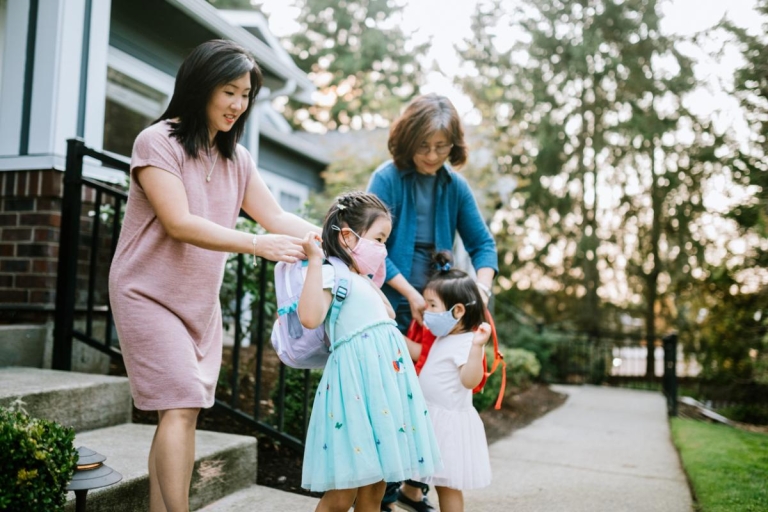your guide to mentally preparing your child for back to school
creating routines makes kids happier and healthier

click here for your free back-to-school downloads!
Back-to-school season is around the corner and will be here before you know it! Soon your child will be waking up early, putting on their best school clothes and heading for the bus stop. Now is the perfect time to help your child put their best foot forward and be mentally prepared for the school year ahead.
why is it important to prepare for going back to school?
While you may still be in the midst of your summer plans, it’s not too early to start preparing for back to school. Why? Well, not waiting until the last second to help your children adjust to their school schedules can have several benefits:
- Your children need time to readjust their sleep schedules after having more lax sleep schedules during the summer.
- Children thrive on routine and consistency so creating a schedule now will help.
- Mentally preparing your child for the school year can help them feel excited, confident, and calm about the new year ahead.
managing expectations for the school year
First, it’s best to manage expectations with your child ahead of the school year. Now is a great time to start new habits and create schedules that will help everyone’s physical and mental health. Start by thinking about the goals, schedules and plans you wish to implement this school year, then work to communicate this with your child. Here are some topics to get that conversation started:
- Homework time – When should homework be started and completed daily?
- Morning routine – What does the morning before a school day look like? Will there be screens or no screens? What time do they have to leave the door to make it to school on time?
- Lunch and breakfast – Will there be lunches packed ahead of time or will your children eat at the cafeteria? Is breakfast expected before the school day or just a quick snack for the bus?
how do I create a sleep schedule?
It’s important to start preparing for back to school by focusing on the sleep schedule. Having a consistent bedtime and wake-up time is important for everyone’s health, both physically and mentally. Start creating a sleep schedule at least two weeks before the first day of school
Start with some of these tips for successfully creating a sleep schedule. The earlier you start the better.
- Give your child some time to decompress before bed
- Adjust bedtime and waketimes by a half-hour at a time each day
- Avoid screens (tv, tablets, phones etc.) 45-60 minutes before bed. Screens emit “blue light” which causes our bodies to slow or stop the production of melatonin (the natural hormone that helps us fall asleep and stay asleep)
how do I start building a routine for back to school?
There are some simple steps you can take to start building your back-to-school routine. While you’re doing this, make sure you practice and review any changes in routine from last year
- If your children are attending a new school, make time for a visit to the school, even if you can only stop by and see the outside.
- If your child is riding the bus for the first time this year, or going to a new bus stop, make some time to visit the bus stop. Will they be walking to the bus stop? Practice the walk to the bus stop.
- Go over the before and after-school care plan with your child and let them know what to expect. This will create stability and familiarity in their minds. If you can introduce them to their caretakers, that’s even better.
- Get in contact with your child’s teacher.
- Print and post your child’s school calendar to help everyone stay aware of important events and days off.
how can I mentally prepare my child for the school year?
Having conversations with your child and setting manageable expectations for the school year can help your child’s mental wellness. These conversations can help diminish any anxieties or stress about going back to school. They can also set the stage for your child to share with you the things that may concern them about school, either now or in the future. Here are some ways to start the conversation to let your child know that you are a safe person to share with.
- Find a quiet and phone-free spot to have your conversation where you won’t be interrupted. Start the conversation on an upbeat and light note:
- “I’m excited for you to start school again!”
- I can’t wait to see all the new things you are going to learn this year!”
- Ask for permission to start the conversation. If your child is not ready, ask them when a good time would be.
- If they are ready to talk, ask them “how are you feeling about starting school again?”
- Ask open-ended questions.
- “Can you tell me more about that?”
- “How did that make you feel?
- Continue to talk about feelings surrounding back to school and let them know it is okay to feel more than one type of feeling
- Thank them for sharing.
- “Thank you for sharing, that had to be hard to tell me, but you still did it.”
- “That was brave of you to share, thank you.”
- Normalize emotions and do not judge or dismiss what your child is sharing.
- Focus on what your child is telling you instead of what you want to say next. Then repeat back what the child has said (reflective listening).
dealing with negative feelings about back-to-school
If, during your conversations about going back to school, your child brings up something that can be considered negative you can handle the discussion using these tips:
- Try to keep the conversation positive while naming, hearing, and understanding their feelings.
- See if they can identify the challenges that they had at school last year.
- Talk with your child about new solutions to their problems.
- Remind them that this is a new school year with a fresh start.
- Ask how you can support and encourage them this year.
- Set some one-on-one time at least two times a week to talk about school issues and their feelings.
- Be intentional about continuing the conversation throughout the school year.
free back to school downloads for your family

As you prepare for back-to-school season with your child, remember that On Our Sleeves offers many free resources for children’s mental health, like the back-to-school checklist and a fun first day of school sign. Visit our free resources page to find these guides and more.
We believe that no family should struggle alone in their journey with mental health. If you’re looking for more ways to support others and discuss mental health, join the movement of On Our Sleeves.
Ways to get involved:
• Become an advocate
• Join our e-community
• Partner with us
• Donate to the cause
• Share your story
care that goes above and beyond
Because every child deserves care that goes above and beyond, Dayton Children’s provides compassionate, expert care for kids of all ages. Find a provider, schedule an appointment, or learn more about conditions we treat today.




